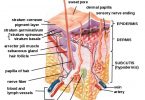Strong bones are an important component for living a good quality of life. Strong healthy bones allow you to move and be active. There is a window of opportunity during childhood and throughout young adulthood to grow and build bone strength. So take advantage of this critical timeframe and nourish your bones while you can. By the time we hit our mid to late thirties we naturally start to lose bone mass and density. This is why broken and fractured bones become an issue as we get older.
How should we keep bones healthy? If I’ve said it once I’ve said it a thousand times…Balance. While it is important to consume adequate amounts of calcium, http://ods.od.nih.gov/factsheets/calcium.asp, and vitamin D, loading up on calcium supplements or any one nutrient can have a negative affect on bone health. Excess amounts of calcium for example can negatively affect copper and zinc absorption. Copper and zinc help build bone strength; and while fiber is considered an important factor for good health in general, too much fiber may be detrimental when it comes to your bones. There are 18 nutrients listed by the National Institute of Health, http://www.niams.nih.gov/health_info/bone/bone_health/nutrition/other_nutrients.asp, contributing to bone health. Finding the right balance between them is what counts.
Consuming vitamins and minerals are not the only consideration for healthy bones. Balancing the acidity and alkalinity, also known as pH balance, of the body is critical for good bone health but is often overlooked. Maintaining an alkaline environment in the body helps to protect bones from calcium loss. Eating acid forming foods will make the body more acidic (meat, dairy, white flour, soda) and alkaline forming foods (vegetables, fruits, nuts, seeds, herbs and spices) will help balance the acidity. If you are looking for a list of foods and a sample menu that will help you better understand how to maintain the proper balance for healthy bones, this website is a good place to start, http://www.betterbones.com/alkalinebalance/dietplan.aspx. Additional factors that affect acid-alkaline balance are exercises and prescription medications.
5 WAYS TO ACHIEVE OPTIMAL BONE HEALTH
- Eat veggies, fruits, herbs and spices to help create an alkaline state in your body; Avoid foods that negatively affect bone (see chart listed in the link above)
- Ask your doctor if the medication you take tips the acid/alkaline balance scale
- Participate in weight bearing exercise
- Add supplements that cover a wider range of nutrients than just calcium and vitamin D
- Practice deep breathing exercises, similar to the ones found in yoga or tai chi
Sitting on the couch eating nothing but meat and drinking too much soda (made up of phosphorous, caffeine and other items that contribute to bone depletion) will not do your bones an ounce of good. Do not forget about your bones when you think about your health.
There has been controversy when it comes to flouride and bone health and I will answer that question next week.
Mission Tie In: Focus on reducing calories or fearing fat will not assist in maintaining bone health. Attention to balancing nutrition and lifestyle is optimal for bone formation and strength. Nourish your body, fuel your life.







Way cool! Some very valid points! I appreciate you penning this article and also the
rest of the site is extremely good.
Thank you!